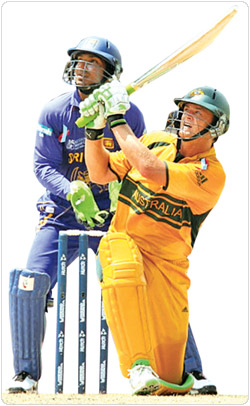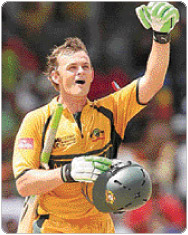|
Adam Gilchrist:
The 'hammer-thrower'
By Dilanka MANNAKKARA
 "Gilly"
as he is fondly known is probably one of the most dominant players in
cricket after Viv Richards in both forms of the game.He is best
remembered for his terrific century against Sri Lanka in the 2007 World
Cup Final where he stole the Cup from Sri Lanka with a blistering 149
off 104 balls, slamming 13 fours and eight sixes, and added it to his 54
and 57 from his previous two global triumphs. "Gilly"
as he is fondly known is probably one of the most dominant players in
cricket after Viv Richards in both forms of the game.He is best
remembered for his terrific century against Sri Lanka in the 2007 World
Cup Final where he stole the Cup from Sri Lanka with a blistering 149
off 104 balls, slamming 13 fours and eight sixes, and added it to his 54
and 57 from his previous two global triumphs.
Taking a tip from his batting coach Bob Meuleman, he put a squash
ball in his glove to allow him to hit straighter - the advice which
should have been patented instantly. He played his own sublime game of
squash, pummelling Sri Lanka's attack.
In the mood he was in, it was impossible to stop him - like pitching
a windbreak to combat a twister. It reminded us of his electrifying
'Ashes' hundred, the second fastest in history!
Ironically, here it was Gilchrist's innings that squeezed the life
out of the game. The instant he stepped down the crease to swat a
Chaminda Vaas delivery he created the momentum upon which Australia
coasted all the way through to the title.
Going in first or seventh, wearing whites or coloureds, Adam
Gilchrist was the symbolic heart of Australia's steamrolling agenda and
the most exhilarating cricketer of the modern age. He was simultaneously
a cheerful throwback to more innocent times, a flap-eared country boy
who 'walked' when given not out in a World Cup semi-final, and swatted
his second ball for six while sitting on a Test pair. "Just hit the
ball," is how he once described his philosophy on batting, and he seldom
strayed from it.
 Employing
a high-on-the-handle grip, he poked good balls into gaps and throttled
most others, invariably with his head straight, wrists soft and balance
sublime. Employing
a high-on-the-handle grip, he poked good balls into gaps and throttled
most others, invariably with his head straight, wrists soft and balance
sublime.
Only at death did he jettison the textbook, whirling his bat like a
hammer-thrower, caring only for the scoreboard and never his average.
Still he managed to score at a tempo - 81 per 100 balls in Tests, 96 in
one-dayers - that made Viv Richards look like a stick-in-the-muds.
When he signed a record A$2m sponsorship deal with Puma in 2004, few
questioned his value for money. Indeed it was arguably Gilchrist's
belated Test arrival that turned the Australian XI from powerful to
overpowering. He bludgeoned 81 on debut, pouched five catches and a
stumping, and barely paused for breath until stepping down in 2008.
Only at the closing stages of an untouchable career did his appetite
slow down - he was troubled by Andrew Flintoff's around-the-wicket angle
during 2005 and found the flaw difficult to overcome - and his
match-turning 144 against Bangladesh in April 2006 was his first century
in 16 Tests.
The 2006-07 Ashes series was literally hit and miss, with three
single-figure scores, two fifties and his most brutal hundred.
At home his one-day form was subdued, but the game's biggest
competition - and it's a most important match - brought out Gilchrist's
highest standards.
In Tests, three Gilchrist innings rank among the most amazing by
Australians: his death-defying unbeaten 149 against Pakistan at Hobart
when all seemed lost, his savage and emotional 204 not out against South
Africa at Johannesburg, and his 57-delivery Ashes century at Perth when
he missed equalling Richards' world mark by a ball.
In one-dayers, his 172 is the third-highest score by an Australian
and his 472 dismissals might take decades to top. As Australia's 41st
Test captain he found the extra burden tiring, and was happy for Ricky
Ponting to step in once Steve Waugh retired.
But as Ponting's fill-in he crossed the final frontier, leading
Australia to their first series win in India for 35 years in 2004-05. As
a wicketkeeper he lacked Rod Marsh's acrobatics and Ian Healy's finesse,
and he probably peaked at 30 in 2002. But if he clutched few screamers
he dropped even fewer sitters, although one easy offering in Adelaide
convinced him it was time to go.
During that match against India he briefly became the leading
gloveman in Test cricket by overtaking Mark Boucher, then the following
day announced his retirement from all cricket but the Indian Premier
League. |